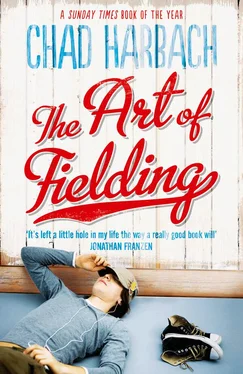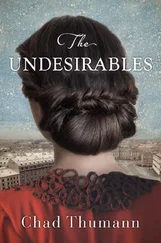That September Affenlight trimmed his beard, bought a suit, and began Harvard’s doctoral program in the History of American Civilization. There he became for the first time — excepting a few lucky moments on the football field — a star. Most of his fellow students were younger, and none had achieved so desperate a grasp on the literature of his chosen period. Affenlight could drink more coffee, not to mention whiskey, than the rest of them put together. Monomaniacal, they called him, an Ahab joke; and when he spoke in seminar — which he did incessantly, having suddenly much to say — they nodded their heads in agreement. Thirty-page papers rolled out of his typewriter in the time it had taken to write a single paragraph of his not-quite-forgotten novel.
At first, Affenlight felt uneasy about his newfound sense of ease. He considered himself a failed writer, nothing more, and there didn’t seem to be much honor or grandeur in having read some books. But soon he decided — whether because it was true or because he needed it to be true — that academia was a world worth conquering. There were fellowships to win, journals to publish in, famous professors to impress. Whatever he applied for, he got; whatever he hinted he might apply for, his classmates shied away from. His successes were social as well. He’d always been tall, square-shouldered, and striking; now he had a purpose, an aura, a name that preceded him. The Cambridge ladies come and go / from Guert’s flat at 50 Bow. That was another joke of his classmates, and it was true.
He wrote his dissertation in the kind of white heat in which he’d always imagined writing a novel — the kind of white heat in which his hero Melville, over six torrid months in a barn in Western Massachusetts, had written the greatest novel the world had ever seen. The dissertation, a study of the homosocial and the homoerotic in nineteenth-century American letters, turned into a book, The Sperm-Squeezers (1987), and the book turned into a sensation: academically influential, widely translated, and reviewed in the Times and Time (“witty and readable,” “augurs a new era of criticism,” “contains signs of genius”). It wasn’t Moby-Dick, but it sold more copies in its first year than The Book had, and it became a touchstone in the culture wars. At thirty Affenlight had been nobody; at thirty-seven he was debating Allan Bloom on CNN.
Just as abruptly, he’d become a father. While preparing the book for publication, he’d been dating a woman named Sarah Coowe, an infectious-disease specialist at MGH. They were evenly matched in many ways: sharp-dressed, sharp-tongued, and devoted to their careers and personal freedoms to the exclusion of any serious interest in so-called romance. They spent ten months together. A few weeks after they broke up — Sarah initiated the split — she called to say that she was pregnant. “It’s mine?” asked Affenlight. “He or she,” replied Sarah, “is mostly mine.”
They named the child Pella — that was Affenlight’s idea, though Sarah certainly had the final say. For those first couple of years, Affenlight conspired as often as he could to show up at Sarah and Pella’s Kendall Square townhouse with expensive takeout and a new toy. He was fascinated with his daughter, with the sheer reality of her, a beautiful something where before there’d been nothing. He hated kissing her good-bye; and yet he relished, couldn’t keep himself from relishing, the total quiet of his own townhouse when he walked in, the scattered books and papers and lack of baby-proofing.
Soon after Pella turned three, Sarah received a grant to go to Uganda, and Pella came to stay with Affenlight for the summer. In August came the news: Sarah’s jeep had rolled off an embankment, and she was dead. Pella was half an orphan, and he was a full-time father.
After a perfunctory stint as an assistant professor, during which a series of winks and perks from the administration kept Stanford and Yale at bay, Affenlight was awarded tenure. He never mustered another major project like The Sperm-Squeezers, but his lectures were the department’s most popular, and the grad students vied fiercely for his favor. He reviewed histories for The New Yorker, stockpiled teaching awards, and kept up with his reading. He became the head of the English Department and a fixture on the Boston magazine Most Eligible Bachelor list. Meanwhile he raised Pella, or at least stood by while Harvard raised her; the entire school seemed to consider her their charge. He sculled on the Charles to stay in shape. He took the Cambridge ladies to the opera. He thought he would do such things forever.
Then, in February of 2002, while Pella was in eighth grade, the phone in his office rang. Affenlight, rattled by what was proposed, dumped his espresso on a stack of senior theses. The interviews and vetting would take months, but that first phone call so unnerved him that he knew it was going to happen. Never again would he stride through the Yard with a graduate student at each elbow, extending the seminar as the sun went down. Never again would he hop the shuttle to LaGuardia just for kicks. Never again would his recent publication record bedevil his sleep. He was headed home.
Chapter 7
Guert Affenlight, sixty years old, president of Westish College, tapped an Italian loafer on the warped maple floorboards of his office on the ground floor of Scull Hall, swirled a last drop of light-shot scotch in his glass. On the love seat sat Bruce Gibbs, the chair of the trustees. It was the last afternoon of March, the eighth year of Affenlight’s tenure.
Besides Affenlight’s desk and the love seat, the room contained two wooden spindle-backed Westish-insignia chairs, two wooden filing cabinets, and a credenza devoted to dark liquor. The built-in floor-to-ceiling bookshelves were filled with leather-bound volumes of and about the American nineteenth century, a drab but lovely sea of browns and olives and faded blacks, alongside neat rows of navy binders and ledgers related to the business of Westish College, and the brushed-steel stereo through whose hidden speakers Affenlight listened to his favorite operas. He kept his more colorful collection of postwar theory and fiction upstairs in his study, along with the handful of truly valuable books he owned — early editions of Walden, A Connecticut Yankee, and a few minor Melville novels, as well as The Book. The room contained so many bookshelves that there was space for only one piece of art, a black-and-white handpainted sign Affenlight had commissioned years ago that constituted one of his prized possessions: NO SUICIDES PERMITTED HERE, it read, AND NO SMOKING IN THE PARLOR.
Gibbs’s walking stick, which he never called a cane, was propped on the love seat’s arm. He sank deeper into the leather, swirled the amber liquid in his tumbler, gazed down at the lone melting cube. “Peaty,” he said. “Nice.”
Affenlight’s scotch was long gone, but to pour another would be to encourage Gibbs to linger. The chill coming off the windowsill at his back reminded him how much he wanted to be out there, at the baseball diamond, before driving down to Milwaukee to pick up Pella from the airport.
Gibbs cleared his throat. “I’m confused, Guert. I thought we’d agreed to postpone new projects until we recapitalized. We got hammered in the markets, we’re hemorrhaging financial aid, and” — he met Affenlight’s eyes steadily — “there’s almost nothing coming in from donors.”
Affenlight understood the admonition. He was the fund-raiser, the face of the school; in his first years on the job he’d mounted the most successful capital campaign in Westish history. But the economy of recent years — the collapse, the crisis, the recession, whatever you called it— had both eroded those gains and frightened donors. His influence among the trustees, once almost boundless, was gently on the wane.
Читать дальше










